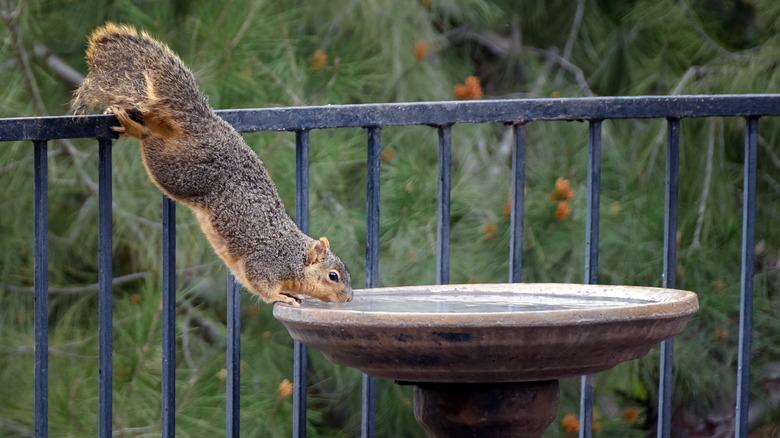With millions of Americans enjoying the hobby of birding, and more joining in all the time, creating a backyard habitat for your feathered friends might seem like a great idea. Sure, birds can be fun to watch, and many are quite beautiful. But as gardeners and homeowners with fruit or nut trees know, they can also be quite a nuisance.
That means while attracting a variety of birds with a lovely bird bath, you can also be inviting a number of problems to your yard. They pilfer nuts from trees, eat your fruits and vegetables, and when the wrong type of bird comes to visit, such as the common grackle, they can be real bullies to other more desirable birds. Other issues include attracting unwelcome animals and insects as well as the all-around bird messiness that can really muck up a nice patio.
There’s some upkeep to consider, too, now that messes have been mentioned. Leaving what amounts to a large bowl of stagnant water unattended for weeks on end can lead to issues that you’ll indisputably find to be unsightly, and it can also be unhealthy for both your family and the birds.
More on unwanted critters attracted to bird baths

One of the biggest issues from a health standpoint is that mosquitoes are drawn to standing water in bird baths. They carry serious diseases like West Nile Virus (per State of Connecticut Mosquito Management Program) that can indeed be a concern in residential areas in the United States. Adding a fountain or other type of water feature to keep the water moving can discourage mosquitoes from breeding there since they’re primarily drawn to still water, but that will also require upkeep to keep it running.
Even the nicest fountain won’t discourage other animals from frequenting your bird bath, though. Take squirrels as an example. If you have a bird feeder, you already know how problematic squirrels can be in a yard. For many people, the last thing they want to do is encourage these little critters, no matter how cute they may be. Other rodents like chipmunks and rats drink from bird baths, too, which can in turn attract larger predators including reptiles. Snakes also drink from bird baths where weather is extremely hot and dry.
If you have pesky raccoons and possums you’re trying to keep out of your yard, a bird bath can attract them as well. Even larger animals such as bears, coyotes, and bobcats have been known to drink from backyard bird baths, and that can pose a threat to small pets along with inviting property damage.
Bird baths can also get really messy
Beyond looking terrible when bird droppings and feathers start to accumulate, the stagnant water in a bird bath can be a breeding ground for avian diseases that can make an entire flock of birds ill in no time. A bird bath needs to be cleaned regularly to keep that from happening so adding one may not be the best choice for a busy household. If you were going to tackle this task, the National Audubon Society says to avoid soapy cleaners since they can remove vital oils from a bird’s feathers. Instead, the organization recommends a regular scrub using one part vinegar to nine parts water. You’ll also have to plan on rinsing and refilling a bird bath every other day to keep the water clean and fresh and algae at bay.
Another thing to keep in mind is that in wooded areas, accumulated debris like leaves and pine needles will need to be removed regularly to keep your bird bath looking good for you and inviting to your feathered friends. If you’re fine with all the upkeep and don’t mind the potential downfalls, you’ll likely enjoy having a bird bath in your yard. Just be sure to take all the good and bad points into consideration before picking one you like.